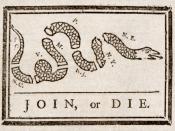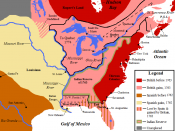Yes, the colonists were justified in waging war and breaking away from Britain.
Thomas Whately, advisor to George Grenville, the British chancellor of the Exchequer, was correct by saying in Document 1, "We are not yet recovered from a war solely fought for their protection." Whately was referring to the French and Indian War (1754-1763). This war indeed cost Britain much, and I do believe the colonists were greatful. However, Britain, after 1763, did not allow the colonists to move west. The colonies were increasing by becoming crowded. New taxes angered them as well. Not being represented in Parliament was tyranny. "Taxation without Representation" was the battle cry. The Stamp Act of 1765 started it all. Every paper, from playing cards to legal documents were taxed. Document 2 refers to this tax as well as the Townsend Act which required the colonists to pay a tax on all British goods.
According to Document 2, this taxes purpose was for simply "Levying money upon us". Still, this tax like the Stamp Act, was levied without representation in Parliament. Colonists boycotted British goods in favor of their own manufactured goods. The 13 colonies were gradually becoming aware of self-government. Men like Patrick Henry and John Dickinson considered these taxes unconstitutional. They voiced their opinions openly.
Townsend's death put an end to his program and Lord North took over as chancellor of the exchequer. He repealed the taxes, except the one on tea. Still, the colonies resented the fact that they had no representation in Parliament and tension between the British soldiers and colonists grew. Fights and altercations between the two intensified. It came to head on March 5, 1770-The Boston Massacre. Boston became the hotbed of the Revolution. Outside the Customs House, soldiers and colonists encountered one another. No one, till this...


